September 25, 2021
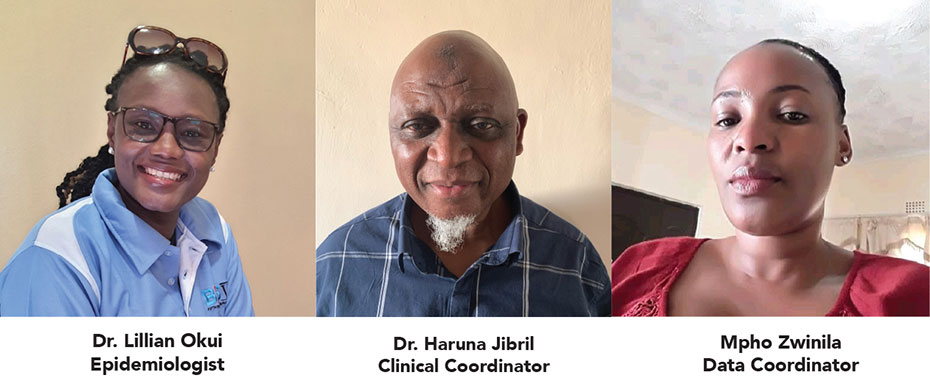
The fifth Botswana HIV/AIDS Impact Survey (BAIS V) has successfully completed field implementation and demobilized from the field. All told, the survey reached more than 13,500 households with nearly 20,000 participants and completed more than 10,000 household interviews.
It will take several months to analyze the data, which is expected to provide a clear picture of the HIV/AIDS landscape in Botswana and identify where resources should be focused to bring the epidemic to an end.
BAIS V will provide accurate measures of prevalence of HIV and the coverage and impact of HIV services, as well as characterizing HIV-related risk behaviors using a nationally representative sample of children aged 6 weeks to 14 years and adults aged 15 years to 64 years. This PEPFAR-funded survey will help the Government of Botswana, its partners, and the public know how many people are currently infected with HIV, how many people have new infections, and how many people living with HIV are on effective treatment.
A Historic Initiative
The full story of BAIS V cannot be told without mentioning COVID-19. Originally slated to take place in 2020, BAIS V was paused at the onset of the pandemic and didn’t commence fieldwork until February 2021.
At the resumption of BAIS V, the project convened a small group of three to lead the COVID-19 response. Over the following months, this trio would lead a herculean effort to safeguard the health of staff and participants and allow the survey to proceed as safely as possible. This team consisted of Dr. Lillian Okui, an epidemiologist from Kumi, Uganda; Dr. Haruna Jibril, a clinical coordinator who is originally from Nigeria but now calls Kanye, Botswana home; and Mpho Zwinila, a data coordinator from Botswana.
Working as a Team
The three members of the COVID-19 team brought different strengths and expertise while filling different roles.
As an epidemiologist, Dr. Okui was responsible for analyzing the COVID-19 data and sharing that information weekly with colleagues at the Centers for Disease Control and Prevention, Ministry of Health and Wellness, and other partner institutions.
Dr. Jibril, a retired pediatrician, called on his medical background while coordinating all COVID activities. He was responsible for monitoring the daily symptoms screening dashboard and talking with any staff who were exhibiting COVID-19 symptoms or had tested positive. Dr. Jibril also oversaw all COVID testing and test results.
Zwinila, the data coordinator, had previously worked as a data monitoring and evaluation staff member for Botswana-Harvard AIDS Institute Partnership. She was responsible for monitoring staff who had entered quarantine or isolation and maintaining the COVID-19 data logs.
“The COVID-19 team worked really well together, shared ideas, and listened to each other,” Dr. Okui said.
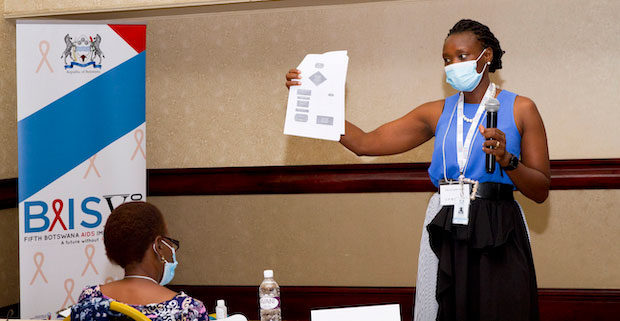
Dr. Lillian Okui speaks at a training of trainers workshop.
COVID in Field Implementation
When the survey began field implementation, Botswana was just beginning its third wave of COVID-19, and this led to increases in community transmission and death.
“Our teams were heavily impacted by COVID,” Dr. Okui said. “At the end of the survey, only two teams had not had a single member of their team in quarantine or isolation. Having teams fall ill was some of our lowest moments as a COVID-19 team, but we are thankful we were able to support them, provide care for them, and provide mental health support for them.”
Throughout the survey, COVID-19 led to staff quarantine and isolation, creating capricious delays in field implementation. Because of COVID-19, the survey that was originally planned for 105 days took a total of 158.
From Dr. Jibril’s perspective, COVID-19 created challenges with human behavior. Staff members eager to get into the field sometimes disregarded their symptoms while filling out the symptoms screening app, for example. “We had to work very hard to make them understand it’s for their own safety and the safety of the whole survey to truthfully screen on the app,” Dr. Jibril said. In other instances, he said he tried to constantly remind and teach staff about the need for social distancing and masking despite natural human tendencies to interact.
Zwinila was a key part in circulating positive and consistent messaging about the need for daily COVID-19 screening and mitigation procedures. When people did fall ill or move into quarantine or isolation, Zwinila also kept them in the loop through WhatsApp reminders.
Reflections on the Survey
As teams demobilize and return to their homes across Botswana, the long-anticipated field work stage has finally drawn to a close. None of this would have been possible without the steady guidance of the three members of the COVID-19 team. They each will remember and take away different aspects of their experience.
Dr. Jibril, who retired as pediatrician in 2018, said he did not expect his medical expertise to come in hand. “I was in a position in this kind of huge survey to contribute to keeping people healthier and safe to perform the survey,” Dr. Jibril said. “I just hope at the end of the day, the little that I’ve been able to do has contributed to the success of the survey.”
From Zwinila: “Looking at this COVID pandemic, I want people to take care of themselves, of their families, of their friends. It was a wonderful team to work with. I really appreciated each and every one of them.”
When Dr. Okui remembers BAIS V, she will think about the extraordinary circumstances surrounding it and the monumental nature of this survey.
“We were given a second chance, and it happened during the era of COVID,” Dr. Okui said. “That we were able to achieve what we have in the middle of a pandemic is momentous.”
Contact
Center for International Health, Education, and Biosecurity
Institute of Human Virology
Anthony Okoth
Regional Communications Specialist
Related stories
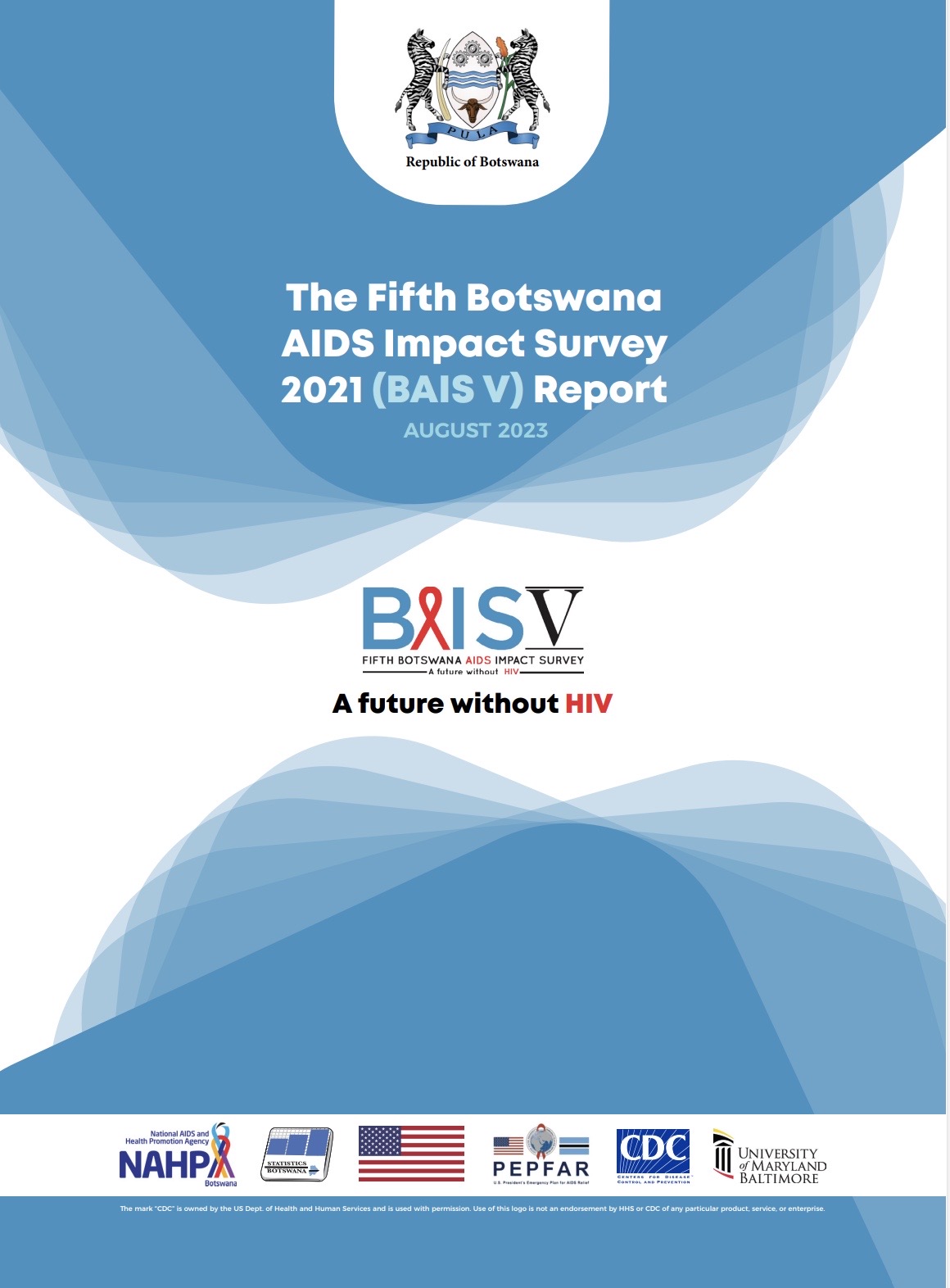
Tuesday, September 19, 2023
BAIS V Report Launched
The Fifth Botswana AIDS Impact Survey (BAIS V) Report 2021 is a nationally representative household-based survey conducted between March and August 2021. Its main aim was to provide information on national and district-level progress towards achieving key HIV targets.

Friday, July 07, 2023
The Intersection of Non-Communicable Diseases and HIV: Opportunities for Botswana to Lead the Response
For a country like Botswana with a high HIV burden, integration of healthcare services is vital to provide comprehensive interventions. Lifestyle factors such as tobacco smoking, alcohol use, unhealthy diet, and physical inactivity heighten the risk of developing NCDs for people living with HIV.

Friday, July 07, 2023
BSMART Study Launch: Combating Smoking Among HIV-Positive Individuals In Botswana
BSMART focuses on identifying effective interventions for HIV-positive individuals who smoke. The launch of the BSMART Study signifies a significant step forward in tackling tobacco use among HIV-positive individuals in Botswana.
Wednesday, June 01, 2022
UMB supports MoH in task-shifting COVID-19 testing
To expand access to COVID-19 testing to rural and hard-to-reach areas, the Ministry of Health (MOH) in Malawi decentralized testing from laboratories using conventional molecular platforms. The University of Maryland, Baltimore (UMB) – Ciheb Malawi AMPLIFY program trained laboratory personnel in peripheral facilities in using rapid antigen testing that can be performed by non-laboratory staff. The MOH started using COVID-19 rapid antigen testing in November 2021 and has continued expanding this service to new testing sites.
Monday, March 21, 2022
US government donates BIAS V survey equipment to Botswana government
The Maryland Global Initiatives Cooperation (MGIC) and Botswana-University of Maryland School of Medicine Health Initiative (Bummhi) held a handover event for equipment used in the Fifth Botswana AIDS Impact Survey (BAIS V) on March 8, 2022 in Gaborone. BAIS V was funded by the Centers for Disease Control and Prevention (CDC) and implemented by MGIC-BW.
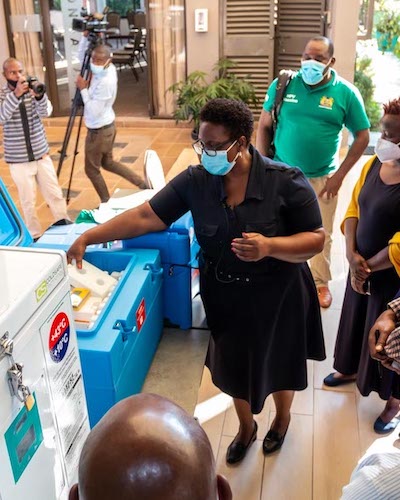
Wednesday, December 08, 2021
Supporting the Rollout of the COVID-19 Vaccine in Kenya
To combat the spread of COVID-19 in Kenya, Ciheb’s local partner, Ciheb-Kenya, received a five-year CDC-funded grant to support national and county activities towards rolling out COVID-19 vaccination. The Technical Assistance to Ready and Accelerate Capacity of public health programs in Kenya (TRACK) program is focused on supporting the development of national policies and training material on COVID-19 vaccination and teaching national trainers to cascade this training to counties.
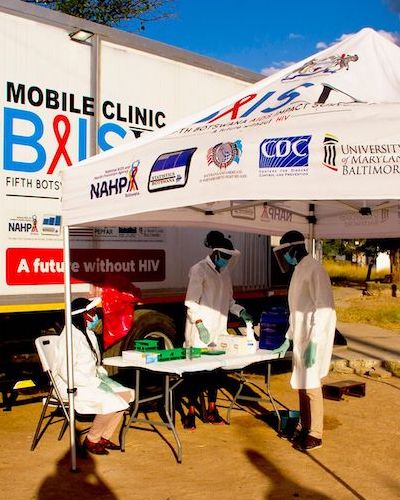
Wednesday, December 01, 2021
Preliminary results of national HIV survey (BAIS V) demonstrate Botswana’s remarkable progress achieving HIV epidemic control
Preliminary results from the fifth Botswana HIV/AIDS Impact Survey (BAIS V), announced today by the President, His Excellency Dr. Mokgweetsi E. K. Masisi demonstrate that for the first time at a national level among adults aged 15-64, Botswana has exceeded the 2020 UNAIDS 90-90-90 targets which call for 90 percent of all people living with HIV (PLHIV) to be aware of their status, 90 percent of those aware of their status to be on antiretroviral treatment (ART), and 90 percent of those on ART to achieve viral load suppression.
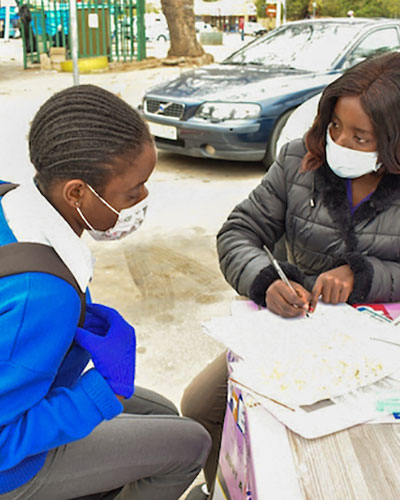
Monday, September 27, 2021
Bummhi Assists National Rollout of PrEP in Botswana
Bummhi — Ciheb’s local partner in Botswana — has made key contributions to the introduction, rollout, and scale up of pre-exposure prophylaxis (PrEP) on a national level to help achieve the UNAIDS 90-90-90 HIV targets more quickly. The rollout process began in 2015 but significantly increased in the last year.
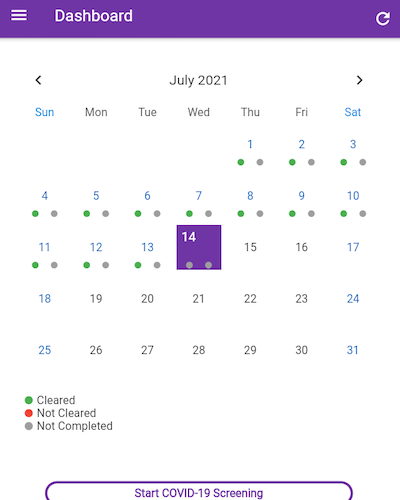
Tuesday, September 07, 2021
COVID-19 Symptoms Monitoring App Supports PHIA Surveys
Working in partnership with national ministries of health, Ciheb has helped conduct population-based HIV impact assessments (PHIAs) in countries supported by PEPFAR. These surveys provide critical information about the status of HIV/AIDS by estimating HIV prevalence, or the total number of people living with HIV (PLHIV) in a country.
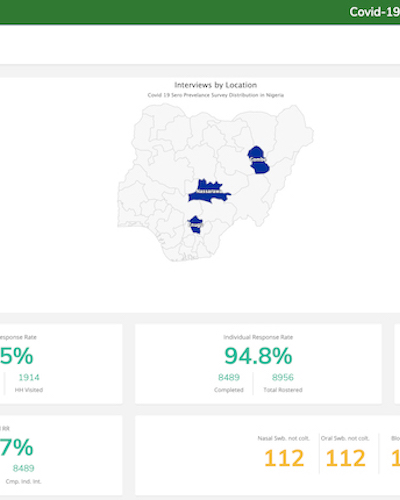
Sunday, September 05, 2021
Dashboards to Support Nigeria COVID-19 Serosurveillance Study
In the fall of 2020, Ciheb conducted the first phase of a COVID-19 population-based serosurveillance study (COVID-19 Household Seroprevalance Survey) in the Nigerian states of Enugu, Nasarawa, and Gombe to assess the prevalence of COVID-19 in the country.
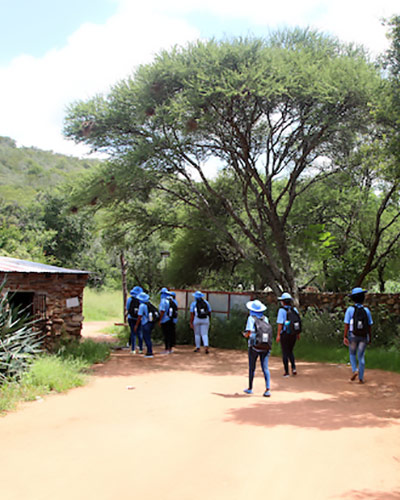
Tuesday, August 31, 2021
Field Implementation Finishes in Botswana's BAIS V Survey
The Fifth Botswana HIV/AIDS Impact Survey (BAIS V) has successfully completed six months of field implementation, and teams have demobilized out of the field. BAIS V reached nearly 20,000 participants, more than 13,500 households, and completed more than 10,000 household interviews.
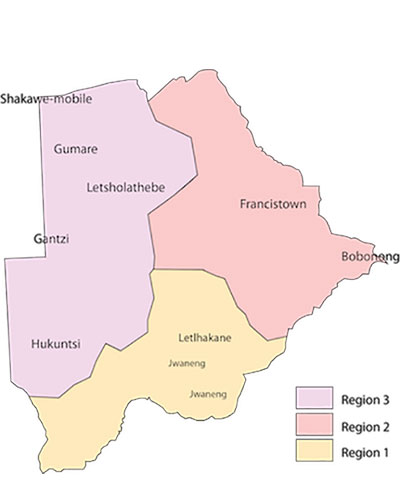
Tuesday, June 01, 2021
HIV/AIDS Survey in Botswana Enters New Phase
The Fifth Botswana HIV/AIDS Impact Survey (BAIS V) has now been in the field for nearly two months and has completed the first wave of implementation. Approximately 3,800 households have been surveyed across the project’s three regions (see map below). This represents approximately one-third of the 13,564 households that will be surveyed nationwide before the project concludes this summer.
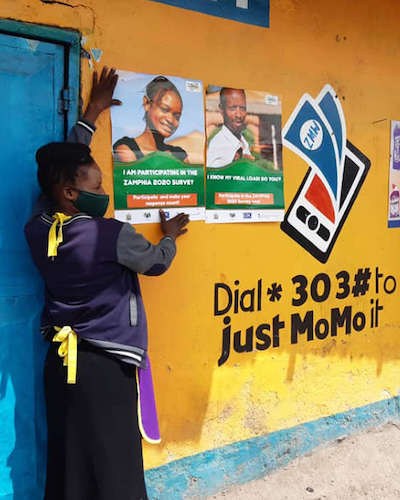
Thursday, May 27, 2021
ZAMPHIA Survey Prepares to Relaunch in Zambia
The Zambia Population-Based HIV Impact Assessment (ZAMPHIA) is preparing to recommence fieldwork at the beginning of May, and staff and communities are being mobilized in anticipation of the relaunch.
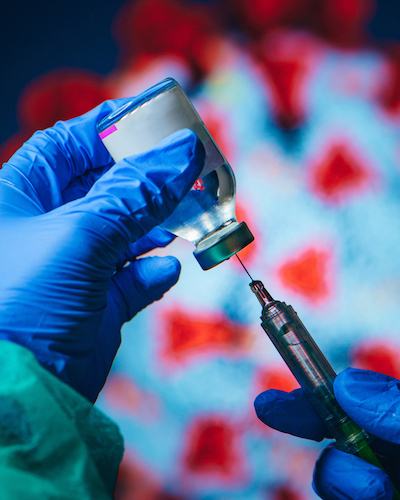
Monday, May 24, 2021
Ciheb-Kenya on the Front Lines of the COVID-19 Vaccine Rollout
Ciheb-Kenya, our local Kenyan partner, has been working with the U.S. Centers for Disease Control and Prevention, the Kenya Ministry of Health, and the National Vaccines and Immunization Programme (NVIP) to support COVID-19 vaccine preparedness through the ongoing Technical Assistance to Ready and Accelerate Capacities of Public Health Programs in Kenya (TRACK) project. Kenya received its first shipment of vaccines several weeks ago and has been moving ahead quickly. As of April 21, a total of 721,509 persons have been vaccinated against COVID-19 countrywide.

